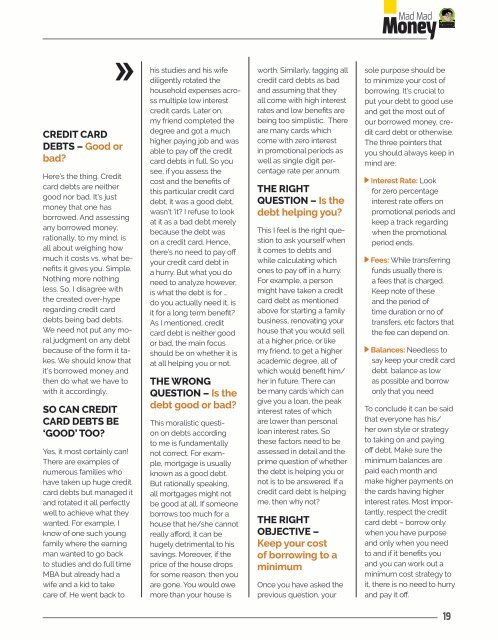Mad Mad Money_Feb2017
In this issue we talk about a few common and persistent mindsets that we have about money – both general and specific. General mindset about money includes beliefs like it is the root cause of all evil and other general aspects like how it is to be looked at, managed and invested. Specific mindsets about money on the other hand include our commonplace thoughts about savings, investments, stock market, debt, etc. Needless to say, most of us harbor a lot of myths, false expectations, erroneous ideas and basically have a very wrong mindset about these specific aspects of money. This issue aims to change it all!
In this issue we talk about a few common and persistent mindsets that we have about money – both general and specific. General mindset about money includes beliefs like it is the root cause of all evil and other general aspects like how it is to be looked at, managed and invested. Specific mindsets about money on the other hand include our commonplace thoughts about savings, investments, stock market, debt, etc. Needless to say, most of us harbor a lot of myths, false expectations, erroneous ideas and basically have a very wrong mindset about these specific aspects of money. This issue aims to change it all!
You also want an ePaper? Increase the reach of your titles
YUMPU automatically turns print PDFs into web optimized ePapers that Google loves.
<strong>Mad</strong> <strong>Mad</strong><br />
<strong>Money</strong><br />
CREDIT CARD<br />
DEBTS – Good or<br />
bad?<br />
Here’s the thing. Credit<br />
card debts are neither<br />
good nor bad. It’s just<br />
money that one has<br />
borrowed. And assessing<br />
any borrowed money,<br />
rationally, to my mind, is<br />
all about weighing how<br />
much it costs vs. what benefits<br />
it gives you. Simple.<br />
Nothing more nothing<br />
less. So, I disagree with<br />
the created over-hype<br />
regarding credit card<br />
debts being bad debts.<br />
We need not put any moral<br />
judgment on any debt<br />
because of the form it takes.<br />
We should know that<br />
it’s borrowed money and<br />
then do what we have to<br />
with it accordingly.<br />
SO CAN CREDIT<br />
CARD DEBTS BE<br />
‘GOOD’ TOO?<br />
Yes, it most certainly can!<br />
There are examples of<br />
numerous families who<br />
have taken up huge credit<br />
card debts but managed it<br />
and rotated it all perfectly<br />
well to achieve what they<br />
wanted. For example, I<br />
know of one such young<br />
family where the earning<br />
man wanted to go back<br />
to studies and do full time<br />
MBA but already had a<br />
wife and a kid to take<br />
care of. He went back to<br />
his studies and his wife<br />
diligently rotated the<br />
household expenses across<br />
multiple low interest<br />
credit cards. Later on,<br />
my friend completed the<br />
degree and got a much<br />
higher paying job and was<br />
able to pay off the credit<br />
card debts in full. So you<br />
see, if you assess the<br />
cost and the benefits of<br />
this particular credit card<br />
debt, it was a good debt,<br />
wasn’t ‘it? I refuse to look<br />
at it as a bad debt merely<br />
because the debt was<br />
on a credit card. Hence,<br />
there’s no need to pay off<br />
your credit card debt in<br />
a hurry. But what you do<br />
need to analyze however,<br />
is what the debt is for …<br />
do you actually need it, is<br />
it for a long term benefit?<br />
As I mentioned, credit<br />
card debt is neither good<br />
or bad, the main focus<br />
should be on whether it is<br />
at all helping you or not.<br />
THE WRONG<br />
QUESTION – Is the<br />
debt good or bad?<br />
This moralistic question<br />
on debts according<br />
to me is fundamentally<br />
not correct. For example,<br />
mortgage is usually<br />
known as a good debt.<br />
But rationally speaking,<br />
all mortgages might not<br />
be good at all. If someone<br />
borrows too much for a<br />
house that he/she cannot<br />
really afford, it can be<br />
hugely detrimental to his<br />
savings. Moreover, if the<br />
price of the house drops<br />
for some reason, then you<br />
are gone. You would owe<br />
more than your house is<br />
worth. Similarly, tagging all<br />
credit card debts as bad<br />
and assuming that they<br />
all come with high interest<br />
rates and low benefits are<br />
being too simplistic. There<br />
are many cards which<br />
come with zero interest<br />
in promotional periods as<br />
well as single digit percentage<br />
rate per annum.<br />
THE RIGHT<br />
QUESTION – Is the<br />
debt helping you?<br />
This I feel is the right question<br />
to ask yourself when<br />
it comes to debts and<br />
while calculating which<br />
ones to pay off in a hurry.<br />
For example, a person<br />
might have taken a credit<br />
card debt as mentioned<br />
above for starting a family<br />
business, renovating your<br />
house that you would sell<br />
at a higher price, or like<br />
my friend, to get a higher<br />
academic degree, all of<br />
which would benefit him/<br />
her in future. There can<br />
be many cards which can<br />
give you a loan, the peak<br />
interest rates of which<br />
are lower than personal<br />
loan interest rates. So<br />
these factors need to be<br />
assessed in detail and the<br />
prime question of whether<br />
the debt is helping you or<br />
not is to be answered. If a<br />
credit card debt is helping<br />
me, then why not?<br />
THE RIGHT<br />
OBJECTIVE –<br />
Keep your cost<br />
of borrowing to a<br />
minimum<br />
Once you have asked the<br />
previous question, your<br />
sole purpose should be<br />
to minimize your cost of<br />
borrowing. It’s crucial to<br />
put your debt to good use<br />
and get the most out of<br />
our borrowed money, credit<br />
card debt or otherwise.<br />
The three pointers that<br />
you should always keep in<br />
mind are:<br />
Interest Rate: Look<br />
for zero percentage<br />
interest rate offers on<br />
promotional periods and<br />
keep a track regarding<br />
when the promotional<br />
period ends.<br />
Fees: While transferring<br />
funds usually there is<br />
a fees that is charged.<br />
Keep note of these<br />
and the period of<br />
time duration or no of<br />
transfers, etc factors that<br />
the fee can depend on.<br />
Balances: Needless to<br />
say keep your credit card<br />
debt balance as low<br />
as possible and borrow<br />
only that you need<br />
To conclude it can be said<br />
that everyone has his/<br />
her own style or strategy<br />
to taking on and paying<br />
off debt. Make sure the<br />
minimum balances are<br />
paid each month and<br />
make higher payments on<br />
the cards having higher<br />
interest rates. Most importantly,<br />
respect the credit<br />
card debt – borrow only<br />
when you have purpose<br />
and only when you need<br />
to and if it benefits you<br />
and you can work out a<br />
minimum cost strategy to<br />
it, there is no need to hurry<br />
and pay it off.<br />
19




